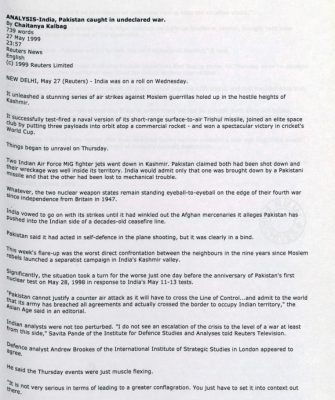ANALYSIS-India, Pakistan caught in undeclared war
[Reuters]
Published date: 27th May 1999
27 May 1999
Reuters News
English
(c) 1999 Reuters Limited
NEW DELHI, May 27 (Reuters) – India was on a roll on Wednesday.
It unleashed a stunning series of air strikes against Moslem guerrillas holed up in the hostile heights of Kashmir.
It successfully test-fired a naval version of its short-range surface-to-air Trishul missile, joined an elite space Club by putting three payloads into orbit atop a commercial rocket – and won a spectacular victory in cricket’s World Cup.
Things began to unravel on Thursday.
Two Indian Air Force MIG fighter jets went down in Kashmir. Pakistan claimed both had been shot down and their wreckage was well inside its territory. India would admit only that one was brought down by a Pakistani missile and that the other had been lost to mechanical trouble.
Whatever, the two nuclear weapon states remain standing eyeball-to-eyeball on the edge of their fourth war since independence from Britain In 1947.
India vowed to go on with its strikes until it had winkled out the Afghan mercenaries it alleges Pakistan has Pushed into the Indian side of a decades-old ceasefire line.
Pakistan said it had acted in self-defence in the plane shooting, but it was clearly in a bind.
This week’s flare-up was the worst direct confrontation between the neighbours in the nine years since Moslem rebels launched a separatist campaign in India’s Kashmir valley.
Significantly, the situation took a turn for the worse just one day before the anniversary of Pakistan’s first nuclear test on May 28, 1998 in response to India’s May 11-13 tests.
Pakistan cannot justify a counter air attack as it will have to cross the Line of Control … and admit to the world that its army has breached all agreements and actually crossed the border to occupy Indian territory,” the Asian Age said in an editorial.
Indian analysts were not too perturbed. “I do not see an escalation of the crisis to the level of a war at least from this side,” Savita Pande of the Institute for Defence Studies and Analyses told Reuters Television.
Defence analyst Andrew Brookes of the International Institute of Strategic Studies in London appeared to agree.
He said the Thursday events were just muscle flexing.
it is not very serious in terms of leading to a greater conflagration. You just have to set it into context out there you’ve got two governments under pressure. You’ve got an Indian one that has been quite rudderless recently. You’ve got a Pakistani one that is under Increasing criticism for locking everybody up and stopping anybody from challenging its autocracy.” but Paul Beaver, a defence analyst at Jane’s Defence Weekly thought it was far more serious.
“I think it’s very serious shooting down other people’s airplanes,” he said, but added:
it won’t go nuclear because although they are nuclear powers, they are not weaponised powers. Just because You’ve done a few tests dosn’t mean you can go and start blowing things up.
“But it certainly does put a lot of pressure on both sides now to keep the situation stable.” Damien Bristow, defence analyst at the Royal Institute for Defence Studies in London, thought both sides would try and make capital out of the showdown.
“My own feeling is … Pakistan will try to milk this for international support,” it said.
Pakistan’s Information Minister Mushahid Hussain underlined that feeling earlier on Thursday when he declared Kashmir was a “nuclear flashpoint” and called for United Nations intervention.
But it was clear that India had been caught off guard by the guerrilla infiltrations, and that the bonhomie that broke out only three months ago between the foes had evaporated.
“The undeclared war has now turned into a war in which there will not be a victor, both sides will be the losers,” the Asian Age said. “Even Pakistan which is keen to convert Kashmir into a nuclear flashpoint to ensure international mediation in the region.”
Gone too was the fond hope voiced after both countries tested nuclear weapons a year ago that there would be less fighting, not more, given the threat of mutually assured destruction.
“Now it seems that all this was so much hogwash,” the Business Standard newspaper wrote. “Nuclear parity or not, Pakistan and India have a host of military problems …”






